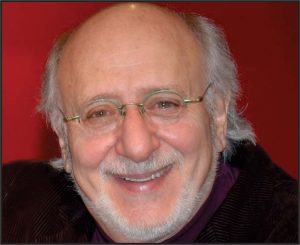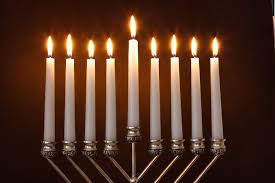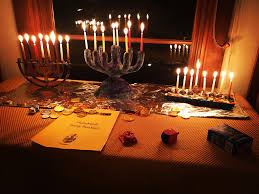The Maccabeats and Naturally 7 will join forces to sing a James Taylor classic, Shed A Litte Light, as we welcome Shabat this Martin Luther King Day weekend.
Shabbat Shalom
The Maccabeats and Naturally 7 will join forces to sing a James Taylor classic, Shed A Litte Light, as we welcome Shabat this Martin Luther King Day weekend.
Shabbat Shalom
May those in harm’s way be protected from the storms. Whether it is the fire of nature or war, may you find a haven, and may the horrors afflicting you end quickly and peace come to you.
May we have the courage to reach out with love and support to those in need and offer solace to those in despair. May these acts of loving kindness spur us to understand the power of humanity and the need for us to care for each other.
~Amen
And He lived…
Vayechi is a misnomer. The chapter that opens with And He Lived is actually the final moments of Jacob’s life. Jacob is on his deathbed, surrounded by his sons. He offers frank assessments of them and blessings of a kind as he prepares to die. Indeed, our tradition looks to this chapter as the essence of the Jewish Ethical Will. It is a centerpiece for me when teaching the Ethical Legacy Will. What we bequeath as our legacy is genuinely profound; what we offer as our final thoughts, spoken and unspoken, will resonate in the hearts and minds of those we leave behind, framing their understandings of their place in the world and how they forge relationships of their own. One of the most striking examples lies outside the text. Nowhere is Jacob’s daughter Dinah to be found.
We can surmise that Dinah’s relationship with her father, Jacob, was not close. In the story of her rape, she is identified as the daughter of Leah. We never hear her voice telling the story, and Jacob’s concern for his sons’ vengeance focuses on how it will complicate things with other clans. He seems unconcerned about whether she was harmed. It is disappointing that Dinah is not at her father’s bed to say goodbye. Every son was there, and even sons not held in particular esteem were present to at least hear their father’s final words.
What is said and what is unspoken, who is in the room, and who is excluded. We learn so much by being aware of these things. We hold an extraordinary power as parents. We are exemplars of behavior and also models of misconduct. Both have a profound impact. We need to exercise caution. For what we say and to whom will last far beyond our mortality.
Did Dinah grieve for Jacob? Did she feel excluded from the intimate space, witness to his passing? Did she harbor resentment about being treated so differently from her brothers? These are only some of the questions the text begs but leaves unanswered. Some may chalk this up to Jacob’s milieu and the age in which he lived. It is unfair to judge a character from the past by current acceptability standards, particularly one with such eminence in our grounding myths.
I am disappointed, however. Jacob’s life trajectory has been extraordinary. At the start, he is a stealthy, guileful, and conniving person who grows and evolves to become rightfully someone worthy of the title Patriarch. His encounters with the Angel at Beth El and his brother Esau exhibit his remarkable growth. His reunion with his son Joseph and his treatment of Manasseh and Ephriam show that he is loving and caring. So, the time here at his bed seems a bit off. I would have thought his compassion and empathy could have extended to all his family. I expected that his harsh words for Reuven, Shimon, and Levi would have been tempered by the knowledge they already knew the consequences of their actions, and leaving them instead with something positive to remember him would serve these sons better. And, of course, there is Dinah, or more precisely, there is not.
This was a final moment to offer some reconciliation. To offer her heartfelt words that might heal wounds that likely could not do so. Some Midrashim suggested that perhaps she was not even around, but she remained in Shechem. The rabbis struggled with her story, offering several alternative ideas about what became of her. There is so much we do not know, and it makes the heart ache to wonder about the pain of being excluded or without a voice.
What we leave behind endures—both the good and the bad. Our legacy is taught in our lives and the examples we set. The Ethical Will offers a chance to leave final words behind, maybe to explain poorly understood behavior, and indeed to provide enduring words of connection. What we say and to whom will be lasting. We need to exercise care for our own sake and on behalf of the hearts of others.
And he lived…
Rabbi Info:
Rabbi David Levin is dedicated to creating a meaningful life journey with Jewish wisdom. He teaches on these subjects, including the Ethical Legacy Will, and can be found at RabbiDavidLevin.com and EthicalLegacyWill.com.
We offer Eshet Chayil verses from the Book of Proverbs at the Shabbat Table. We are grateful for the “woman of valor,” the specialness of our life partner.
The Shvesters bring these verses to life in a beautiful song.
Shabbat Shalom
#BringThemHome
 Peter Yarrow’s death has us saying goodbye, but his legacy is complicated. We’ve been engaged in the conversation regarding him and his song, Light One Candle, which is the Hanukkah song embraced by many Jews as a profoundly emotional iconic expression of our tradition. At about the same time that Yarrow entered hospice, many learned that he was accused of sexual misconduct. This reignited a debate about how we might separate the artist from his creation. Can his extraordinary music and activism be decoupled from his egregious behavior, or must we sacrifice his beautiful music because of his actions?
Peter Yarrow’s death has us saying goodbye, but his legacy is complicated. We’ve been engaged in the conversation regarding him and his song, Light One Candle, which is the Hanukkah song embraced by many Jews as a profoundly emotional iconic expression of our tradition. At about the same time that Yarrow entered hospice, many learned that he was accused of sexual misconduct. This reignited a debate about how we might separate the artist from his creation. Can his extraordinary music and activism be decoupled from his egregious behavior, or must we sacrifice his beautiful music because of his actions?
We’ve had this difficult conversation before, and many people have weighed the pros and cons of Yarrow, Carlebach, and others who have disappointed us as human beings yet created extraordinary artistic works.
I do not have an answer to the question. Do we stop singing Yarrow’s music? It’s more than just the songs he’s written, but also the songs he’s performed, most notably as part of the famous trio Peter, Paul, and Mary. It’s a thorny question that must be addressed, but I don’t think a blanket statement suffices; that is the easy way out. Instead, each of us needs to take responsibility for considering whether or not we are comfortable and where we may draw lines that we are unwilling to cross. Perhaps it’s with some footnote when we sing a song, or maybe it’s part of a community decision about whether the music is acceptable. But the conversation needs to occur. We must confront the ugliness and beauty and figure out how to weave them in a way that might work for us and the people we serve.
So, I’m not prepared to cancel him, but I must talk about him entirely. I am unwilling to discard all of the music he brought into our lives, yet that music cannot be heard without the more discomforting voice of his actions and the ethical dilemmas they present.
It’s messy and complicated, but we must consider, deliberate, and decide for ourselves and our respective communities how best to proceed.
The New Year is upon us. I pause and look back to look ahead.
I’ve realized that sometimes I squander my gifts. I am blessed with a lot for which I should be, and I am thankful. I live a blessed life with a loving partner, family, friends, inspiring and rewarding work, and Rashi, the Portuguese Wonder (water) Dog.
But when things are good, we tend to take them for granted. When we don’t appreciate them thoroughly, we risk losing them. We all must continue nurturing them so they do not slip away from neglect.
It is too easy to forget that. We can all be neglectful, expecting the good things always to be there.
So, let’s not squander our gifts. Take a moment to reflect on what is truly meaningful in your life. Commit to celebrating and nurturing our core values and relationships. And make sure to let those special people in your lives know it. Please do not take any of it for granted.
I enter the year hoping to focus on the truly important things, the people, and the values I hold dear. I hope you do that, too, as we enter 2025.
Wishing everyone a happy and healthy New Year!
Six13 shares its Jewish version of Defying Gravity.
Wishing you Chag Urim Sameach, Shabbat Shalom and the bringing of peace.
#BringThemHome
How do you light the Chanukah Menorah?
As you can imagine , this was a discussion among the Rabbis. The Talmud famously pits the House of Shammai against the House of Hillel, our preeminent first pair of rabbis.
, this was a discussion among the Rabbis. The Talmud famously pits the House of Shammai against the House of Hillel, our preeminent first pair of rabbis.
Do you light one candle the first night and increase another candle every night until all are lit on the eighth day?
Or do you light all the candles on the First day and decrease the number until you reach one candle?
Most of us know Hillel won that argument, so we increase the light with every passing day.
 Do you use Applesauce or Sour Cream when you eat latkes? They never decided on this argument, so we do both! (actually, I am pretty sure they never engaged in this discussion- I am making it up)
Do you use Applesauce or Sour Cream when you eat latkes? They never decided on this argument, so we do both! (actually, I am pretty sure they never engaged in this discussion- I am making it up)
Do you light one Menorah for the family, or does everyone get to light their own?
 Did you know the Menorah we use for Chanukah is called a Chanukiah? (it is an eight-light, plus Shamash, candelabra as distinguished from the seven-armed menorah used in the Temple).
Did you know the Menorah we use for Chanukah is called a Chanukiah? (it is an eight-light, plus Shamash, candelabra as distinguished from the seven-armed menorah used in the Temple).
Do you put the menorah in your front window for the community to view?
Why do I always seem to lack the right number of candles?
And when I buy candles on sale after Chanukah, I can’t remember where I put them for the next year.
Last but not least, is it Chanukah, Hannukah, or Channukah, Hanukah, Hanukkah, etc.?
We can get all caught up in both the fun and serious questions as we determine how we want to celebrate our holiday. But remember it is about celebrating the holiday.
It is a time of celebration and rededication. We remember the story of Jewish victory, which instilled pride in our heritage and gave us strength and confidence as we face seemingly enormous challenges today. We spend time with our family, sharing the light’s glow, the pleasure of the food, and the fun of the games. May your Chanukah be wonderous!
Chag Urim Sameach, Happy Hanukah!
Chanukah is almost here! Let’s start now with Watch Me by Six13.
A time for rededication to who we are shining light into the darkness.
Chag Urim Sameach
Shabbat Shalom
 The manger scene of the Baby Jesus swaddled in a Keffiyeh has created much commotion and attention. Even though the Vatican has removed the display, the consciousness-raising alone means that the image has had the intended effect.
The manger scene of the Baby Jesus swaddled in a Keffiyeh has created much commotion and attention. Even though the Vatican has removed the display, the consciousness-raising alone means that the image has had the intended effect.
We are talking front and center through religion about the plight of the Palestinian people.
This is not the first time someone has reinterpreted something for their own purpose. I have seen many iterations of Jesus: white, very white, swarthy, black. Many religions that have Jesus at the center of their theology have him displayed realistically on the cross, his body cradled in his mother’s arms, lovingly gazing down upon us in a portrait or looking upwards in an icon. As a babe in mother’s arms, as a man spreading the Word, at a bountiful supper, and as a martyr. And now swaddled in a keffiyeh. We use religious symbols to motivate the audience toward a vision or narrative. This is frequently for good and exemplary purposes and too often for malicious purposes.
The charge that this current manger display is Antisemitic is a particular, not universally shared Jewish perspective. Some deliberately embrace that evil message. I am sure that was not the intent of the Pope or the Church. And if the manger is allowed to be a message of hatred, it will have failed miserably in its mission.
Raising awareness of the plight of the Palestinians is important. Christmas is an essential Christian symbol of God’s love and our hope. Peace on Earth and Goodwill towards men is the universal message of the extraordinary celebration.
Can this awareness-raising symbol be channeled into constructive forces to promote the welfare of the Palestinian people, who have been victimized for too long? It is time for the people of goodwill to lay down their arms and reach out across the divide to each other. May love supplant the hatred that has kept both sides at war for too long. May the promise of Christmas resound in that troubled place of Jesus’ birth so that two people learn to live together in peace and security.
Merry Christmas!